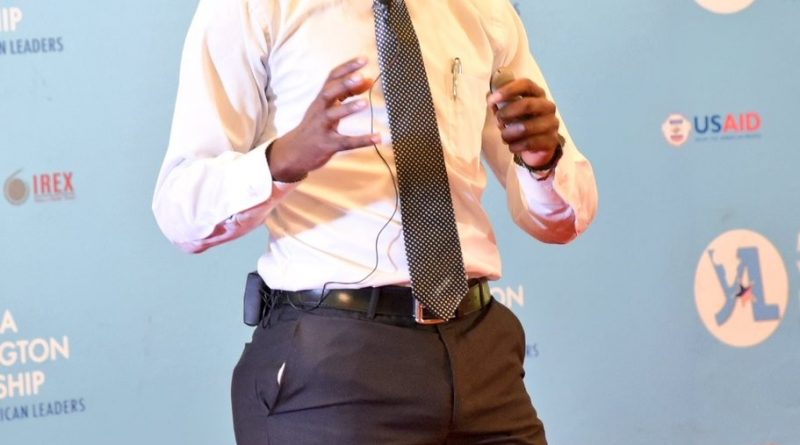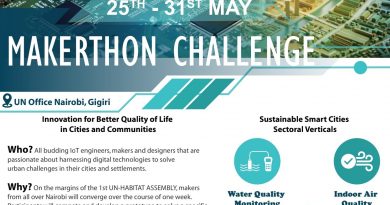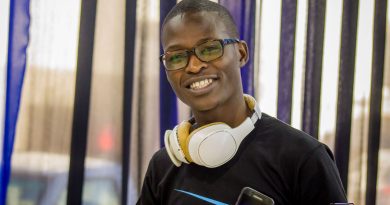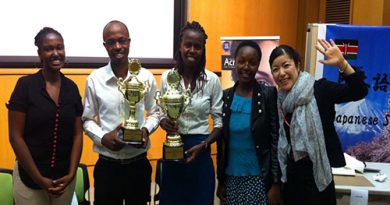Alumnus of the Week; Mandela-Washington Fellow, Dr. Saoke Churchill
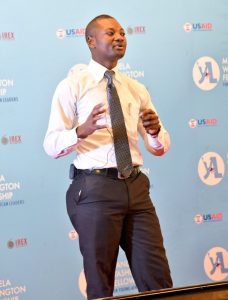
Just what exactly motivates a man to do anything? Many times in the wake of a great innovation, achievement or accomplishment, this is a question that so often people forget to ask or bother about, yet it should be at the centre of attention and a basis for understanding any process for that matter. For one Dr. Saoke Churchill, his motivation came from an experience when he was doing his undergraduate studies at JKUAT. He narrates how a visit with his Maasai roommate to Namanga several years back inspired him to develop an integrated wind and solar system to provide energy for the nomadic communities, an idea that is now set to revolutionize wind power generation in the country and the entire region.
Dr. Saoke’s innovation, christened ‘WISH’ to imply Wind Solar Hybrid, is an integrated Wind and Solar System that is built to produce energy in very low wind areas. The portable low wind turbine can produce 25 watts of electricity from winds as low as 2m/s. But who exactly is Dr. Saoke Churchill, you ask.
Dr. Saoke is a Specialist in Wind and Solar Energy Technologies, and a lecturer at JKUAT’s Physics Department, in the College of Pure and Applied Sciences (COPAS). He is an alumnus of JKUAT, holding a Bachelors of Science Degree in Physics, Masters of Science Degree in Physics and currently almost graduating with a PhD in Physics, with a specialty in Wind Energy Engineering. Actually, it’s imperative to mention that as at the time of publishing this article, Dr. Saoke would be few hours away from being awarded his doctorate at the JKUAT’s 27th Graduation Ceremony, scheduled for 30th June, 2016.
His narrative however doesn’t end with academic credentials. The Physicist is also a member of the prestigious Mandela-Washington Fellowship, having been bestowed the honor in 2015. In this capacity, he recently participated in a pitch competition at the Fellowship’s 2016 Eastern Africa Regional Conference, where his innovation, WISH, emerged second overall. Dr. Saoke is also currently the Secretary General of the JKUAT Alumni Association. I would go on and on, but enough of my rant. Let’s hear what the Professor-in-waiting has to say verbatim.
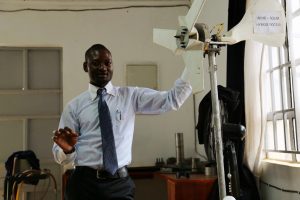
What is the idea behind the wind energy innovation you recently launched?
The project is christened ‘A Nomadic WISH’, where we were trying to look at how an integrated wind and solar system can be useful in providing a stable basic power source to nomadic communities who move from one area to another. This was part of a long process of research work we have done from the technical part, turbine development, the integrated system as well as an analysis of the migration patterns of the nomadic communities.
What specifically motivated you to facilitate an innovation specifically geared at the Nomadic communities?
First I have to mention that there’s poor distribution of electricity from the national grid and an urgent need for cleaner renewable energy, but my immediate motivation came from a personal experience. When I was an undergraduate student, my roommate was a Maasai and there was a time I visited him in Namanga. Being nomads the house we were hosted in was a temporary structure where they had just settled few days before, and their sole source of power and light was firewood. The question that disturbed my mind was how could someone survive in that environment, especially for school going children who are expected to perform like the rest of the country. Therefore when I got into this consortium of research we looked into how best we could bring power to the most vulnerable communities in the world, and that’s when the idea of a portable wind system came up. This portability can also aid people who are going to camps or even researchers.
With the mindset of helping the vulnerable communities, how affordable is this system?
Actually part of our analysis was on how best this system can penetrate into these communities because a research that doesn’t get into development phase to actually bring impact is void. We came up with a model through which we are now seeking partners to help take this technology into the communities, especially in the piloting stage. My hope is that we can have on board more partners which will in effect help subsidize the cost to ensure it actually benefits those it was created for because the people we are dealing with have extremely low income.
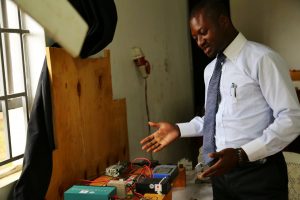
Away from your innovation; From your professional experience, what should be done to foster more of such research works, especially up to the development stages?
Essentially there are three players in any particular research; the researcher, the University and the Industry. The principal role of any University is research. Apart from this, a University is tasked with providing new knowledge to the industry. It is then the responsibility of the industry to find new ways of doing things and coming up with new products. A researcher brings on board an abstract idea, and it is then the role of the industry to facilitate the development of the research into a practical solution. Close partnership and integration between these players is therefore very crucial, but unfortunately it has not been optimal in many circumstances across all Universities in the country.
Shifting the focus to you being an alumnus, what can you say sets JKUAT apart from the rest?
I have said this before; JKUAT is a premier University of Technology. When it comes to this, I don’t see any University beating JKUAT, and this is simply a statement of fact. Another aspect is the good internal systems, especially the academic processes. The University has strong internal mechanisms and structures which gives it a cutting age.
As an undergraduate student, what was your most memorable experience?
Let me give two. When I joined first year I had so much expectations. I actually imagined I could be able to make a car after the first semester, only to go for my units and encounter a lot of maths and theory. This made me appreciate the chronological process that the University curriculum has to take. You cannot count ten before counting one. Another instance was when I was in the student government as the Academic Secretary. I remember the current Vice Chancellor was the DVC Academic Affairs at the time. We managed through the student leadership to successfully spearhead a change of the University academic calendar, which at that time was 16 weeks and was very punitive to the students. Our proposal of a reduction to 15 weeks got adopted by the Senate, and this was memorable to me because we managed to facilitate this without necessarily resorting to strikes or student unrest.

